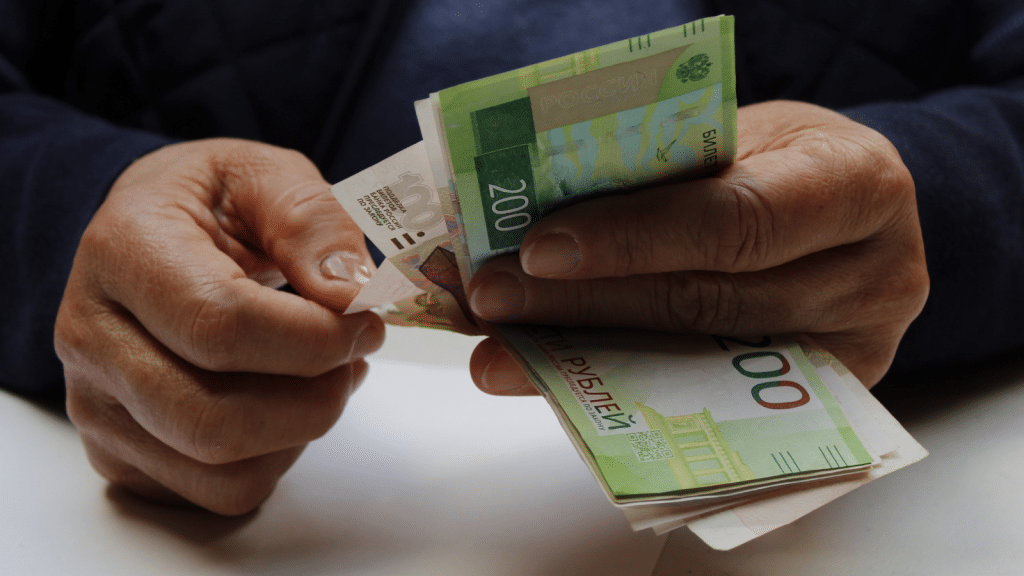Russia invaded Ukraine, but imposing financial sanctions like SWIFT may not be the best path forward.
By Aaron Arnold | February 24, 2022
 Woman handling Russian bills
Woman handling Russian bills
After weeks of mounting tension and feints and misdirection, the deed was done.
Last night, while Ambassadors read from previously-prepared remarks and issued calls for peace during an emergency UN Security Council meeting, Putin begin an invasion of Ukraine. The UN Secretary General, António Guterres, called on Russia’s President Vladimir Putin directly to stop his troops from invading Ukraine and give peace a chance.
The first round of sanctions from the West were weak.
Earlier—in response to Putin’s ordering of troops into two breakaway regions of Ukraine under the pretext of a so-called “peacekeeping mission,” violating Ukraine’s territorial integrity and upending international norms—the United States and its allies had begun rolling out sanctions against Russia. The United States placed sanctions on two Russian state-owned banks—the Corporation Bank for Development and Foreign Economic Affairs, known in Russian as the Vnesheconombank (VEB); and the Promsvyazbank Public Joint Stock Company (PSB). According to a press release, the Treasury Department targeted the two banks for their roles in raising revenues for the Russian state (e.g., bond sales, which in turn can be used to help pay for Russian weaponry and other materiel to use against Ukraine). US sanctions also included targeted financial sanctions against several Russian oligarchs and members of Putin’s inner circle, as well as extending the prohibitions on dealing in Russia’s sovereign debt.
Much to everyone’s surprise, Germany’s Chancellor Scholz also pulled the plug on Russia’s controversial Nord Stream 2 pipeline, which was on track to begin supplying Germany with Russian gas—a blow to Russia’s energy sector. Right on cue, Russia’s former President and current deputy chairman of the Security Council of Russia, Dmitry Medvedev, lashed out on Twitter, suggesting that Europeans are in store for higher energy prices. Russia currently supplies nearly 40 percent of the European Union’s natural gas supply. Europeans are already experiencing higher than average energy prices due to increased global demand. Russia’s threats of weaponizing its energy exports will only send prices soaring higher.
But those were not the only sanctions imposed by the West. UK Foreign Secretary Liz Truss announced sanctions against several Russian oligarchs and banks with close connections to the Kremlin—including freezing the assets of PSB bank. Finally, the European Union outlined plans to restrict Russia’s access to Europe’s financial and capital markets, while also imposing targeted sanctions against 351 members of Russia’s State Duma who voted to recognize what they called the “independence” of the two breakaway regions of Ukraine.
Indeed, the sanctions imposed by the United States and its allies make a strong statement, but do they go far enough? Pundits and sanctions experts seemed in near universal agreement that the sanctions did not go far enough. Tom Keatinge, Director of the Royal United Service Institute’s Centre for Financial Crime and Security Studies, quipped that the United Kingdom has brought a “peashooter to a gunfight.”
Congressional leaders also seem somewhat surprised by the lackluster response. Sen. Bob Menendez (D-N.J.), Chairman of the Senate Foreign Relations Committee, suggested that the United States should “use the overwhelming amount of [sanctions] now,” but keep the “mother of all sanctions” in reserve—stopping just short of unplugging Russia from SWIFT, a keystone of the international banking infrastructure. Ranking member of the same committee, Sen. Jim Risch (R-ID) called for sanctions that “Putin cannot ignore,” but did not offer hints at what those may be.
The sanctions scorecard could be better and Western leaders are now promising a more potent round of sanctions, with many speculating a ban from SWIFT.
What does it mean to expel Russia from SWIFT?
In the weeks leading up to Moscow’s aggressions, US and European leaders had hinted at a “mother of all sanctions” package, should Putin invade Ukraine. Many took this to mean Russia’s expulsion from SWIFT— the Belgium-based cooperative that provides secure financial messaging to banks around the world. In effect, SWIFT is the standard-setter when it comes to how banks communicate with each other.
Importantly, SWIFT is about more than just secure messaging—it is an integral part of the global financial system’s infrastructure. While it is often described as “email for banks,” in reality it is more like the internet for banks—a system of secure routing protocols in a consistent format. One of SWIFT’s biggest roles is facilitating cross-border transactions. Last year, the organization averaged 42 million messages per day.
Getting booted from SWIFT, however, would be like losing access to the internet. Sure, it’s slower and more difficult—but communication is still possible. The same is true for Russia’s access to SWIFT. In the short term, chaos would ensue as Russia’s banks were left suddenly without a way to communicate with the rest of the world. When international finance and trade moves at the speed of light, the cost of time adds up quickly. But recovery is not impossible.
To see why, we only need to look back at what happened in March 2012, when the European Council, under pressure from the United States, took the then-unprecedented decision to expel Iran’s banks from SWIFT. The effects were immediate and devastating—at once demonstrating the power of SWIFT over international banking, as well as how a new era had emerged which could turn global banking’s infrastructure into political weapons.
But over the longer term while Iran was unable to pay for imports or accept payments for exports, Iranian oil exports remained largely unaffected.
So why did the SWIFT ban—“the mother of all sanctions”—not result in the cataclysmic collapse of Iran? The reason is that while a SWIFT ban increases costs—sometimes significantly—it does not necessarily “block” transactions completely. Without access to SWIFT, Iranian banks resorted to other forms of communication, namely by fax, email, and telephone.
The same is true for Russia, although the effects may be more pronounced because it is simply a bigger economy. A SWIFT ban would make life difficult for Russia’s banks, but not impossible.
Would a ban be too costly for Europe?
After weeks of threatening to ban Russia from SWIFT, the Biden administration seemed to suddenly back away from the prospect in mid-February. According to accounts in the press, European leaders expressed worry that a SWIFT ban on Russia would mean that billions of dollars in outstanding loans would not be repaid. At the end of 2021, for example, French claims on Russia amounted to just over $25 billion. The Economist estimates that European banks have nearly $56 billion owed by Russian residents. Moreover, nearly $350 billion worth of EU assets rest inside Russian territory.
There are also concerns that leveraging Russia out of SWIFT would be viewed as overtly politicizing an organization that is still widely considered to be more-or-less neutral. These fears, however, are probably overblown. US authorities have relied on SWIFT for years to support its counter-terrorist financing efforts, without so much as a murmur from other Western governments. Re-instating Iran’s access to SWIFT was a vital part of the Joint Comprehensive Plan of Action—the 2015 agreement between China, France, Russia, United Kingdom, United States, Germany, and Iran that provided sanctions relief in exchange for curbs on Iran’s nuclear program—that essentially rewarded Iran for complying with the agreement. In other words, this supposedly neutral, Belgium-based banking cooperative was used for political reasons—albeit good reasons (in the form of encouraging Iran to stay away from acquitting nuclear weapons).
The reality is that the ship has sailed on the politicization of SWIFT. Both Russia and China know it, and both have sought to start their own alternatives to SWIFT in order to insulate themselves from Western-backed sanctions—sanctions that could limit their access to the international financial system. They’ve encountered varying degrees of success. Russia’s central bank set up its SWIFT-like SPFS service in 2014, but has since struggled to attract customers and predominantly handles domestic transfers. In actuality, SPFS would offer little relief should the West boot Russia from SWIFT.
Probably more important and influential, however, are technological advances that threaten SWIFT—and hence SWIFT’s usefulness as a tool for financial sanctions. Central Bank Digital Currencies (CBDC), for example, are digital forms of currency issued by central banks. Although they are often discussed together with other types of virtual assets, like Bitcoin, they are not a cryptocurrency. Instead, they are more like a US dollar that you keep on your smartphone—able to spend exactly as you would cash.
While there are lengthy lists of reasons why this may be a bad idea (think privacy), digital currencies do threaten to upend the infrastructure underpinning cross-border transactions and completely eliminating the need for an organization like SWIFT. Russia, China, and the United States are all exploring different approaches to CBDCs. But this is not an immediate concern and is still quite a number of years away from coming to fruition.
A SWIFT ban will hurt Russia (and the West) but coordinated sanctions against Russia’s banks will have the same effect.
Ultimately, banning Russia from SWIFT now would have significant effects—including, unfortunately, perhaps even negative blow-black against US interests—but they would ultimately be short-lived. Undoubtedly, Russia and the financial system would adapt, perhaps using less technical means or other transfer systems like SWIFT. And the collateral damage to banks in the West could be significant. But the reality is that coordinated sanctions against Russian banks will have the same effect as a SWIFT ban—but perhaps without all the fuss.
The better strategy is to continue the course of imposing sanctions against specific Russian banks. Targeted sanctions against Putin’s cronies should continue as well, but the impact of those may be limited. Evading targeted sanctions just takes practice. To really bring the pain, the United States and its allies need to coordinate against Russian energy and financial services sectors, as well as stand ready to impose secondary sanctions against jurisdictions where Putin will seek refuge.
Together, we make the world safer.
The Bulletin elevates expert voices above the noise. But as an independent nonprofit organization, our operations depend on the support of readers like you. Help us continue to deliver quality journalism that holds leaders accountable. Your support of our work at any level is important. In return, we promise our coverage will be understandable, influential, vigilant, solution-oriented, and fair-minded. Together we can make a difference.
Keywords: Bitcoin, Russia-Ukraine, SWIFT, Ukraine, Ukraine conflict, Ukraine crisis, financial sanctions
Topics: Analysis















